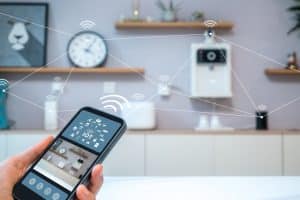How to Start an Internet of Things (IoT) E-Commerce Business

The Internet of Things (IoT) is one of the most significant technological developments of modern times. The connection of everyday devices to the internet allows individuals and business owners a whole new level of control over their daily lives.
In this article, we'll discuss how you can get started with an IoT-based e-commerce business in the most cost-effective way.
What Is an IoT Device?
An Internet of Things device is a physical object like an appliance, a gadget, or a watch that connects to the Internet. Think of smartwatches that measure and record your heartbeat and the number of steps you take every day. Think of Amazon Echo and Google Home.
IoT devices use the power of the Internet to collect and exchange data. These devices may be used for simple, everyday tasks but can also aid health workers and soldiers. There are a lot of possibilities with IoT devices, and there's an increasing demand for them as the Internet becomes a bigger part of our lives.
How to Build an IoT-Based Business
The trend has already infiltrated virtually every aspect of commerce, which makes it ripe for entrepreneurial opportunity. But what's the most cost-effective and practical way to build an IoT-based company?
As with most startup efforts, step one is about choosing a particular product and operational model. Founders also need to shore up their personal finances to gain access to as much capital as possible. Consolidating college loans is one way to get that process underway. Advertising and promotion are two of the main expense categories for new owners, so it's imperative to develop a marketing plan well before launch.
Choosing a suitable product or service is of paramount importance as well. There are dozens of avenues to pursue, but the most popular paths to profitability tend to include one of four areas:
- health and fitness
- air quality
- home security, and
- kitchen appliances.
Here are pertinent details about launching a successful e-commerce company in the IoT niche.
#1Consolidate College Loans First
One of the primary advantages of starting an e-business is the low cost. Resellers need only pay for a website, establish a connection with a supplier, and advertise. Marketing is usually the most significant line-item expense for founders, but the initial launch is not a pricey affair. That's why consolidating student loans is an excellent technique for budding entrepreneurs in this field.
However, it's imperative for owners to understand that consolidations come with pros and cons. Begin by reviewing an informative guide on the topic to learn all the details about consolidating college debt.
#2Decide on a Product and Business Model
Choosing the right operational framework and product or service are two of the fundamental phases of initiating a for-profit entity. In the internet-of-things niche, they are crucial steps that call for focused attention by owners, investors, and future managers. Why is it that so many successful startups in the space begin as e-commerce merchant sites?
The answer lies in the very essence of IoT, which is a unique marriage of technology and digital connectedness. E-sellers of products like smart security systems for residential homes can market to vast numbers of people in a wide range of demographics. Products like connected alarms, doorbell cams, and anti-intrusion lighting are gaining ground among a new generation of consumers who want to purchase smart devices at reasonable prices.
Home security and kitchen appliances are two of the best categories you can consider.
Home Security
The home protection, anti-intrusion, and general security product lines have been enjoying a resurgence of popularity since the advent of smart and internet-connected technology. After lower prices and affordable all-in-one systems for homes and offices became available, the niche entered a golden age of growth and expansion.
Leading the way are some of the hottest e-commerce products of the decade, like miniature surveillance cameras, motion-sensitive lighting arrays, laser-enabled tripwires, vibration locks for windows, smart locking devices for doors, and more. Most e-sellers in this space work with major manufacturers, who handle shipping and customer service for all the products.
Kitchen Appliances
Kitchen-based technology includes dozens of everyday devices and appliances that have been huge sellers for decades. The latest twist on the offerings is that they're connected to the net, easier to program, more energy-efficient, and affordable. The first wave of high-tech kitchen items appeared in the early 2000s, but prices were unusually high, and consumers who could afford them struggled to understand the complex operating instructions.
That all changed when manufacturers began selling connected appliances like toasters, blenders, microwaves, refrigerators, and ovens. Entrepreneurs who run cooking and food blogs can easily set up e-commerce stores that earn commission on affiliate sales. Additionally, there are several highly successful podcasters operating in the niche.
#3Know Where and How to Advertise
E-entrepreneurs in the IoT niche need to be creative about advertising and promotion. Most potential customers are internet savvy and spend a considerable amount of time online. Affiliate sellers can gain traction by setting up product review sites and linking various products directly from their pages. Bloggers in the space use the same kind of linkage but focus on filling their sites with relevant journalistic content on developments in the internet-of-things commercial field.
Resellers and other entrepreneurs advertise directly by purchasing linked ads on search engines, topical blogs, and tech websites. Earning income as an e-commerce owner involves strategizing about how and where to reach the target market. Most startups in the segment spend the bulk of their operational capital on marketing, advertising, and promotional campaigns.





